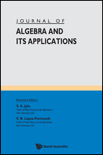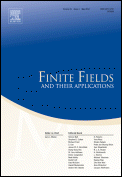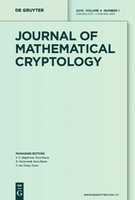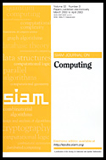
DESIGNS CODES AND CRYPTOGRAPHY
Scope & Guideline
Illuminating the Path of Discrete Mathematics and Coding Theory
Introduction
Aims and Scopes
- Combinatorial Designs:
Research related to the construction, properties, and applications of combinatorial designs such as block designs, Steiner systems, and Latin squares. - Coding Theory:
Exploration of various coding techniques, including linear codes, cyclic codes, and error-correcting codes, focusing on their construction, properties, and applications in data transmission and storage. - Cryptography:
Development and analysis of cryptographic protocols, including public key infrastructure, encryption schemes, and secure multi-party computation, emphasizing their security aspects and practical implementations. - Algebraic Methods:
Utilization of algebraic techniques in the study of codes and cryptographic systems, including polynomial functions, finite fields, and group theory. - Quantum Codes:
Investigation of quantum error-correcting codes and their applications in quantum cryptography, reflecting the growing importance of quantum information theory. - Algorithm Development:
Focus on algorithms for coding and cryptography, including decoding algorithms, cryptanalysis methods, and efficient computational techniques.
Trending and Emerging
- Post-Quantum Cryptography:
With the rise of quantum computing, there is an increasing emphasis on developing cryptographic systems resilient to quantum attacks, evident in the growing number of papers addressing post-quantum security. - Locally Repairable Codes:
Research on locally repairable codes (LRCs) is on the rise, focusing on codes that allow for efficient recovery of data in storage systems, reflecting practical needs in data integrity and reliability. - Functional Encryption:
The concept of functional encryption, which allows computations on encrypted data, is gaining attention, indicating a trend towards privacy-preserving data processing techniques. - Network Coding:
The application of coding theory to network scenarios, particularly in enhancing data throughput and reliability in communication networks, is a rapidly growing area of interest. - Algebraic Geometry Codes:
There is increased research into algebraic geometry codes, which utilize geometric properties for coding theory, showing potential for new applications and deeper theoretical insights. - Security Analysis of Cryptosystems:
An expanding focus on the security analysis of various cryptographic systems, including novel attacks and defenses, reflects the evolving landscape of cybersecurity threats.
Declining or Waning
- Classical Code Constructions:
There has been a noticeable decrease in publications focusing solely on traditional coding constructions, such as Hamming codes and Reed-Solomon codes, as newer methods and more complex structures gain traction. - Basic Cryptographic Protocols:
Research on fundamental cryptographic protocols, including standard RSA and basic symmetric encryption, appears to be waning, replaced by more advanced cryptographic schemes that address contemporary security challenges. - Elementary Combinatorial Designs:
Interest in simpler combinatorial designs, such as basic block designs without additional structures or constraints, has decreased as researchers pursue more complex and application-driven designs.
Similar Journals

JOURNAL OF ALGEBRA AND ITS APPLICATIONS
Exploring the Frontiers of Algebra and Its ApplicationsJOURNAL OF ALGEBRA AND ITS APPLICATIONS, published by WORLD SCIENTIFIC PUBL CO PTE LTD, stands as a pivotal resource for scholars in the fields of Algebra and Applied Mathematics. With an ISSN of 0219-4988 and E-ISSN 1793-6829, this journal has been providing a forum for the dissemination of cutting-edge research since its inception in 2008, converging towards a forward-looking timeline extending to 2024. As of 2023, it has earned a commendable Q2 ranking in both Algebra and Number Theory, as well as Applied Mathematics, reflecting its solid impact within the mathematical community. With a Scopus rank of #49/119 in Algebra and Number Theory, and #420/635 in Applied Mathematics, the journal captures significant advancements and applications across various mathematical domains. While it does not operate under an open access model, its comprehensive articles and research outputs are crucial for fostering intellectual dialogue and innovation in academia. Researchers, professionals, and students alike will find this journal an indispensable asset for their scientific pursuits and explorations into the vast field of mathematics.

Prikladnaya Diskretnaya Matematika
Bridging Theory and Application in Discrete Mathematics.Prikladnaya Diskretnaya Matematika, published by the PUBLISHING HOUSE SCIENTIFIC & TECHNICAL LITERATURE in the Russian Federation, serves as a vital resource for scholars and practitioners in the realms of applied mathematics, computational theory, and discrete mathematics. With an ISSN of 2071-0410 and an E-ISSN of 2311-2263, this journal has been actively contributing to the academic discourse since its inception in 2016, with expectations to continue until at least 2024. Although currently positioned in the Q4 category across several disciplines—including applied mathematics, computational theory, and signal processing—this journal offers a unique opportunity for researchers to contribute to an evolving field, despite facing competitive rankings in the Scopus database. The open access nature of the journal reflects a commitment to disseminating knowledge broadly, albeit details regarding access options remain unspecified. As a publication dedicated to fostering innovation and collaboration in theoretical and practical applications, Prikladnaya Diskretnaya Matematika plays an important role in advancing mathematical theories and practices, making it pertinent for those engaged in research and application within these critical domains.

FINITE FIELDS AND THEIR APPLICATIONS
Empowering Research in Algebra and Its Diverse Applications.FINITE FIELDS AND THEIR APPLICATIONS is a premier academic journal published by Academic Press Inc. Elsevier Science that focuses on the interdisciplinary study of finite fields and their diverse applications across various domains of mathematics and engineering. With an ISSN of 1071-5797 and an E-ISSN of 1090-2465, this journal has established itself as a leading platform for researchers, professionals, and students aiming to explore advancements in Algebra and Number Theory, Applied Mathematics, and Engineering. Awarded a Q1 ranking in multiple categories by Scopus in 2023, this journal features rigorous peer-reviewed articles that contribute to both theoretical developments and practical applications, reflecting its relevance within the mathematical sciences community. The journal's convergence over the years from 1995 to 2024 highlights its sustained commitment to quality research, making it an invaluable resource for those seeking to deepen their understanding of finite fields and their significance in contemporary mathematical discourse.

Journal of Mathematical Cryptology
Exploring the Frontiers of Mathematical Cryptology for a Secure TomorrowThe Journal of Mathematical Cryptology, published by DE GRUYTER POLAND SP Z O O, is a pioneering open-access journal that has been a valuable resource for researchers and professionals in the field of mathematical cryptography since its inception in 2007. With an ISSN of 1862-2976 and an E-ISSN of 1862-2984, this journal provides a platform for cutting-edge research, aiming to address the complexities and challenges presented by the evolving landscape of cybersecurity. As of 2023, the journal holds a respectable Q3 ranking in Applied Mathematics, Computational Mathematics, and Computer Science Applications, reflecting its relevance and growing impact within these disciplines. Although it currently has an H-index of "-", the qualitative contributions of the journal are recognized through its Scopus rankings, including a placement in the 58th percentile for Applied Mathematics. The journal is committed to fostering collaboration and innovation in mathematical methodologies applied to cryptography, thus attracting a diverse audience of researchers, students, and industry professionals. By embracing an open-access model since 2020, the Journal of Mathematical Cryptology enhances the visibility and accessibility of essential research findings, making it a crucial resource in the academic community.

Advances in Mathematics of Communications
Unlocking the Potential of Mathematical CommunicationsAdvances in Mathematics of Communications, published by the American Institute of Mathematical Sciences (AIMS), is a leading journal dedicated to the dissemination of high-quality research in the fields of algebra, number theory, applied mathematics, discrete mathematics, combinatorics, and computer networks. Established in 2008, this journal has quickly established itself as a significant contributor to mathematical communications, holding a reputable position in the Scopus rankings, with impressive category quartiles, including Q2 rankings in key areas such as Algebra and Number Theory and Applied Mathematics. Besides its rigorous peer-review process, the journal facilitates the growth of innovative ideas and methodologies that bridge the gap between theory and application. With no open access restrictions, Advances in Mathematics of Communications aims to provide an inclusive platform for researchers, professionals, and students to share their findings and insights, fostering collaboration and advancing the global knowledge base in the mathematical sciences. The journal's commitment to excellence ensures its role as an essential resource in the ever-evolving landscape of mathematics.

CANADIAN JOURNAL OF MATHEMATICS-JOURNAL CANADIEN DE MATHEMATIQUES
Unveiling the complexities of mathematics for a brighter future.Canadian Journal of Mathematics - Journal Canadien de Mathématiques is a prestigious peer-reviewed journal published by Cambridge University Press, which aims to advance the field of mathematics through the dissemination of high-quality research articles. With its ISSN 0008-414X and E-ISSN 1496-4279, the journal plays a pivotal role in fostering mathematical research and collaboration. It has been recognized for its impactful contributions, currently holding a category quartile ranking of Q2 in Mathematics (miscellaneous) for 2023 and sits in the 66th percentile among its peers according to Scopus rankings. As the journal continues its convergence from its inception in 1994 through to 2024, it remains a vital resource for researchers, professionals, and students seeking to stay at the forefront of mathematical developments. The journal does not operate under an open access model, allowing for a curated collection of articles that adhere to rigorous academic standards.

Science China-Information Sciences
Exploring the Intersection of Theory and Practical Application.Science China-Information Sciences is a prestigious academic journal published by SCIENCE PRESS, dedicated to advancing knowledge in the field of information sciences and computer science. Established in China, the journal has gained a remarkable reputation, with a 2023 category quartile ranking of Q1 in Computer Science (miscellaneous) and an impressive Scopus rank of #16 out of 232 in General Computer Science, positioning it within the 93rd percentile. The journal embraces a broad spectrum of topics, from theoretical frameworks to practical applications, providing a platform for researchers, professionals, and students to disseminate their findings and engage with the latest advancements in the field. With open access options available, Science China-Information Sciences ensures that innovative research is accessible to a global audience, fostering collaboration and interdisciplinary dialogue. The journal not only reflects the evolving landscape of information sciences but also plays a pivotal role in shaping future research directions.

SIAM JOURNAL ON COMPUTING
Exploring Theoretical Breakthroughs in Computing.Welcome to the SIAM Journal on Computing, a premier publication of SIAM Publications dedicated to advancing the field of computational science. Established in 1984, this journal provides a platform for groundbreaking research and theoretical advancements that shape the landscape of both Computer Science and Mathematics. With an impressive impact factor and consistently ranking in Q1 quartiles for its categories, the journal remains an essential resource for scholars looking to contribute to innovative computational theories and methodologies. Although not currently an open-access journal, the SIAM Journal on Computing offers rigorous peer-reviewed articles, ensuring high-quality contributions that appeal to researchers, professionals, and students alike. As we converge towards 2024, this journal continues to play a vital role in influencing future research directions and fostering an academic community devoted to the exploration of computational challenges. Join us in exploring the forefront of computing research!

Problems of Information Transmission
Pioneering Research in Transmission TechnologiesProblems of Information Transmission, an esteemed journal published by PLEIADES PUBLISHING INC, serves as a critical platform for scholarly discourse in the fields of computer networks, communications, computer science applications, and information systems. Established in 1972 and resuming publication from 2005 to 2024, this journal provides a rigorous peer-reviewed environment for researchers to present their findings, methodologies, and innovative applications. With a noteworthy impact factor and categorized as Q3 in several relevant fields in 2023, it ranks within the 30th percentile amongst its peers, indicating its established presence in the academic community. Although the journal is not open access, it remains an essential resource for professionals and students seeking to explore contemporary challenges and advancements in information transmission. For those pursuing knowledge in these dynamic areas, Problems of Information Transmission represents a significant and authoritative source of cutting-edge research and insights.

ARS Mathematica Contemporanea
Advancing the Frontiers of Mathematical KnowledgeARS Mathematica Contemporanea, published by UP FAMNIT in Slovenia, stands as a pivotal journal within the fields of algebra, number theory, discrete mathematics, geometric topology, and theoretical computer science. Since its inception in 2011, this journal has consistently provided a rich platform for innovative research, garnering a commendable Q2 category ranking in various mathematical domains, including Algebra and Number Theory, and Geometry and Topology, showcasing its growing influence and prestige in the academic community. With an increasing Scopus rank—particularly notable in Algebra and Number Theory at the 71st percentile—ARS Mathematica Contemporanea is dedicated to publishing high-quality, peer-reviewed content that advances the frontiers of mathematical knowledge. The journal’s commitment to open access ensures that valuable research is readily available to scholars, practitioners, and students alike, fostering collaboration and dissemination of ideas across the globe. As it converges towards its dedicated timeline extending to 2024, ARS Mathematica Contemporanea remains a crucial resource for those engaged in mathematical research, presenting an array of theoretical and practical insights that define contemporary mathematical discourse.